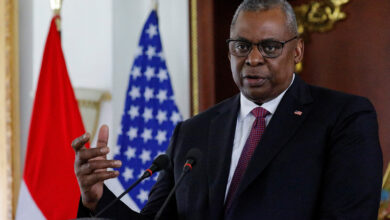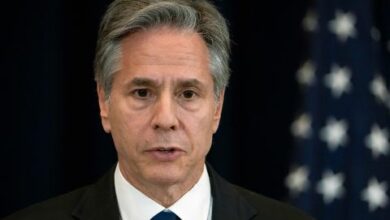The 25 January revolution was a truly Egyptian revolution. Inspired by the youth, it was quickly joined by millions of Egyptians from various segments of society. There is no doubt that the revolution has lost its direction, momentum and magnitude, mainly due to faults committed by the Supreme Council of the Armed Forces (SCAF). However, the United States has also played a role that aims at limiting and directing the revolution’s goal of building a true democratic state in Egypt.
In essence, the United States does not know how to deal with a multiparty system. Its bias is thus always to the promotion of a single ruler with whom it can build a good relationship that will serve its interests. Obviously, dealing with a corrupt autocratic head of state is much easier than dealing with a genuinely democratic leader who has to obtain the approval of his people and state institutions.
With all the turbulence that is taking place in the Middle East and with the long-standing Arab-Israeli conflict, the United States does not want to deal with a democratic leader who might lead his nation in a direction that is not in its favor. This does not mean that it has influenced the decisions of the Egyptian people concerning their choice of president. Nevertheless, the US attitude has clearly had an impact on Egypt’s transitional roadmap. By influencing the democratic components towards Islamic parties, it favored the Muslim Brotherhood’s presidential and parliamentary candidates.
A review of the milestones that the Egyptian revolution has faced clearly shows that the United States only speaks out during events that favor the Islamic parties, while turning a blind eye on tens of other incidents that disfavor the status of Islamic parties, especially the Muslim Brotherhood’s party. In addition (as admitted recently by the committee that produced the March 2011 constitutional declaration) the US exerted pressure on SCAF to announce constitutional declarations that favored the Muslim Brotherhood.
And although the United States does not have the power to produce an Arab leader who will sponsor its foreign policy, it does have the means to provide strong support for any such leader who does emerge. This was the case regarding former Egyptian President Hosni Mubarak, Egypt’s interim military rulers and current Egyptian president Mohamed Morsy.
For the United States, Mubarak was an excellent president. He provided full-fledge support for US foreign interests; fighting terrorism (a common cause for both parties), boycotting Iran (no big sacrifice for Mubarak; on the contrary, it helped him to strengthen personal relations with Arab Gulf rulers), isolating Hamas and sustaining the peace agreement with Israel (both these issues were also in the interest of Mubarak).
I often argue with friends and politicians who are strong advocates of conspiracy theories and who believe in the existence of a big "master plan" formulated by the United States to enable it to manage the minutest details of all the events of the Arab revolutions. According to this theory, we, the Arabs, are simply following this master plan. Advocates of this theory even claim that the attacks on United States embassies are part of the plan, intended to justify a number of actions that the US plans to carry out in the future. My counterargument to this theory is that the United States does not deserve any credit for what has been taking place in the Arab World over the past two years, nor does it have a plan or roadmap for what is happening.
The evolutions of the Arab revolutions take the United States, like us, by surprise. Most of its actions are a reaction to what is happening. Furthermore, a superpower does not need to conspire; it has the privilege of dictating its agenda on any political force that is ruling the country. The United States has very simple, shortsighted and immature policy vis-à-vis Arab leaders: ‘You scratch my back, I will scratch yours’. This policy has been adopted, indiscriminately, in its dealings with Mubarak, with SCAF and with the Muslim Brotherhood. Being good, and obeying the United States’ instructions will ensure getting its support; refraining from doing so will lead to other, unpleasant scenarios.
The Muslim Brotherhood is not a new entity for the United States! It is a political organization, with an Islamic label, that has existed for over 80 years. United States Administrations and Muslim Brotherhood leaders have met and dealt with one another on various occasions in the past. The United States used to employ the Muslim Brotherhood as a pressure tool in the downside of its relationship with Mubarak, stating that Egypt needed to take steps towards establishing a democracy — which obviously meant replacing Mubarak with the Muslim Brotherhood. In reality, the United States had no intention of getting rid of its good-man in the Middle East, nor was its government interested in the establishment of genuine democracy.
Dealing with the Muslim Brotherhood now that they are in power is, however, very different from flirting with them when they were in the opposition. In the wake of recent events triggered by the production, in the United States, of a film, that is insulting to Muslims, the Brotherhood issued an English language press release condemning the attack on the US Embassy in Egypt. At the same time, the Muslim Brotherhood’s Arabic language website was fuelling people’s rage and blaming the US for broadcasting the movie. This is one example of the real world ambiguous Muslim Brotherhood policy, a policy that attempts to convey a message of modernity to the world, while transmitting a completely different one of strict rigidness to its followers.
President Morsy often sends signals to his supporters insinuating that a president from the Muslim Brotherhood means that "Islam is Back." While these signals keep the president’s followers strong and united, various followers can also understand them differently. Consequently, Morsy did not want to defend the United States in the film incident mentioned above, because that might have upset the preachers who help him to mobilize Egyptians during elections, encouraging them to vote for the Islamist parties. Thus, although Morsy definitely does not encourage terrorism, he often sends out wrong signals that can lead to violence — such as publicly blaming the United States for the production of the film.
Over the last two years, the United States has proposed a number of failed initiatives and concepts that all concluded in enhancing our autocratic leaders rather than in the building of a genuine democracy. After the ousting of Mubarak, the United States found itself in an odd position. It had not played any role in the revolution that it could present to American citizens. The only gateway was through the American political organizations that were working in Egypt to build up democratic capacity. The US therefore substantially increased its funding of these organizations with the aim of working to rapidly expand their work, enabling the Administration to claim a role in the Egyptian revolution.
The increase in role and budget of these organizations was sufficient for the Egyptian government to bring administrative, legal and even espionage charges against them, and the government managed to get rid of them with widespread public backing. Even so, the programs of these organizations were beyond the capacities of the nascent Egyptian political parties, and they produced no benefits, apart from wasting the American taxpayers’ money. Moreover, the United States has launched a number of programs such as entrepreneurship training, building women’s capacities, among many others. These programs all sound good, but they only address a tiny segment of Egyptian society — for political purposes and not for the good of the country. The programs help to widen the gap between Egyptians and Americans, while at the same time benefitting the Egyptian ruler acting as patriot.
Hopefully, the United States will come to understand the mechanism and dynamics of the Egyptian terrorism cycle. It begins with Islamic preachers who direct their anger at advocates of an Egyptian civil state, rationalizing any murderous or terrorist activities against Islamic enemies. This message is often well received by large numbers of ignorant and illiterate poverty-stricken Islamists, who are frustrated with their lives and willing to die for an Islamic cause, thus ensuring a place in Heaven. A few incidents took place in recent months whereby a small group of ordinary Islamists tried to impose their understanding of Islam on Egyptians. Some of these incidents ended in the killing of innocent Egyptians. In due course, these Islamist types will target the US, who is always blamed for our internal conflicts.
It was also noticed that the people who were recently beaten by Islamists during the clashes that took place close to the presidential palace had succumbed to more brutal treatment than that meted out by Mubarak era police attacking politicians. Now, under Muslim Brotherhood rule, the attacks were carried out by Brotherhood militia, but with an Islamic justification.
Political developments currently underway in Egypt have nothing to do with building a modern democratic state. Working under the auspices of the United States, they aim at establishing a failed state governed by an archaic mentality that misunderstands the real values of Islam and the basic principles of democracy. It is a well known fact that democracy is not only about elections; it is also about applying and enforcing proper rule of law, empowering institutions, establishing a fully independent judiciary system, forging laws that protect freedom of expression and recognizing the rights of minorities and other groups.
Egyptians lived under military rule for almost six decades, until we managed to partially get rid of the military rulers or, to be more exact, to minimize their power by drawing up a deal with the Muslim Brotherhood whereby the military apparatus maintains its autonomous economic status and independence, while the Muslim Brotherhood rules Egypt.
Encouraging the military to acquire a bigger role in Egyptian politics will not be a good approach. We need to minimize their power even more while simultaneously building a true democratic state based on the above-mentioned democratic pillars, regardless of how long this will take. Egyptian revolutionaries are able to accomplish this mission. It may be at some cost, and will take some time, but I am certain that it will happen. At that moment, the United States, which has been working against the goals of the Egyptian revolution, will find no friends in our country.
Mohamed Nosseir is a member of the Free Egyptians Party political bureau.




